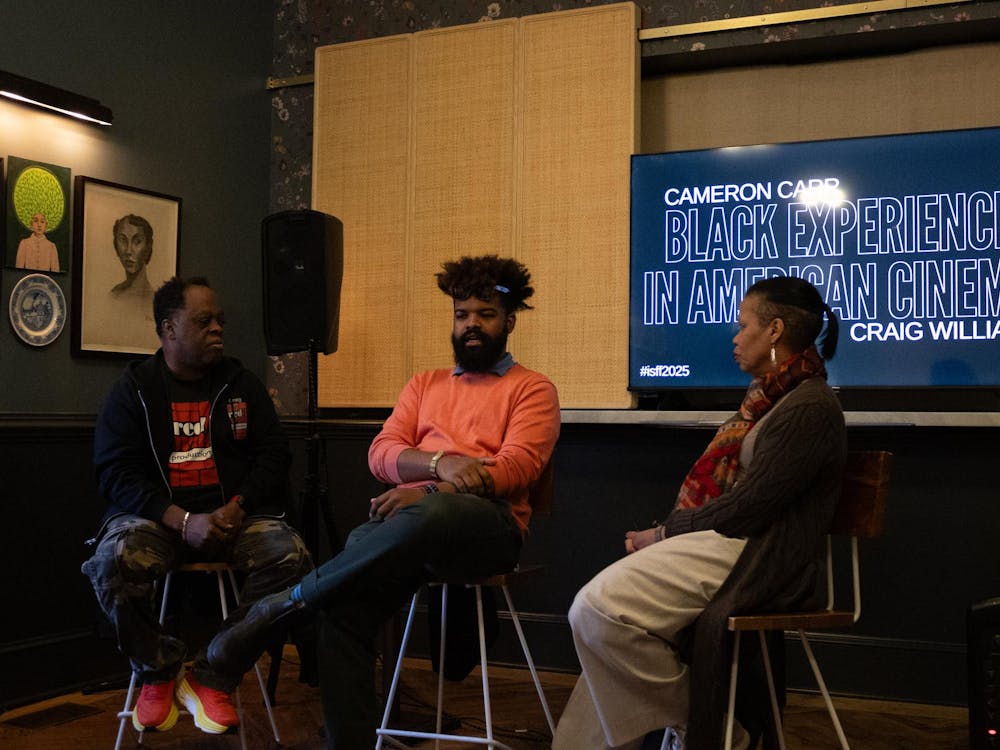Attending screenings at the annual Virginia Film Festival is like drinking a glass of red wine and then having a conversation with the vintner. It might not be the newest or most buzzworthy drink (here’s looking at you “Ciroc boys”), and you might not always enjoy the wine, but the experience allows you to understand the mastery it took to create the wine and gives you a new appreciation.
This is how I felt about David Rosenthal’s latest film, “A Single Shot.” I see the cinematic value of the film. Eduard Grau, the cinematographer, shows his mastery with intriguing angles and smart lighting. The acting is superb with Sam Rockwell giving life to the internal struggles of his character, who says little and yet is the focal point of the film. The literary genius behind the film, which is based on Matthew Jones’ novel by the same title, shines through in each and every scene. And yet, this film doesn’t make my taste buds sing to the heavens and back in the same way that a great glass of red wine does — though admittedly, that is a tall order.
The film, set in a rural town in upstate New York, follows a middle-aged, unemployed man, John Moon (Rockwell) struggling through the aftermath of accidentally killing a young woman while poaching for food. This woman, however, is no ordinary hiker, but actually part of an elaborate criminal money scheme. Trapped in this criminal spiral, John is threatened and tormented by unseen men demanding he return the money he took off the dead girl and planned to use to better his life and buy back the wife who left him for a brighter future for herself and their son. The story leaves John unsure of himself and cruelly victimized by own mistakes.
“A Single Shot” begins not with the shot that sets the supposedly fast-paced film into motion, but instead with a rather mundane scene. John moseys around his trailer, getting ready for the morning’s poaching from the local national park. The suspense just doesn’t hit the right note — to be honest, it doesn’t hit at all. I wish it had started with the bang that I anticipated from the synopsis; perhaps it would have set a better tone for the rest of the film. Instead, I sat around for 10 minutes waiting for the film to actually start.
But perhaps we can chalk that flaw up to my own impatience. The acting was truly superb and, in the true spirit of the festival, Jones offered interesting insight into the making of the film afterward. He wrote the screenplay himself after five screenplays didn’t meet his expectations because they veered too far from the source material.
But those rejected writers’ urges to move away from the book are understandable. The narrative relies heavily on John’s internal guilt about his accidental murder, and movies without voiceovers struggle to convey that same level of internal strife. Even though Rockwell did as good a job as anyone could hope for, without knowledge of the book beforehand much of the character’s motives seemed ambiguous.
This leaves a lot of room for potential misunderstanding. Though Jones insisted that John should be seen as a “good guy,” many could look at his actions differently. This is complicated by the strange drawl the actors adopted for the film. It was often difficult to understand what came across as an almost “southern” accent — peculiar because Jones insists the film is set in upstate New York, where he grew up, and was filmed in Vancouver. The only actors speaking clearly enough to understand were Ophelia Lovibond who plays Abbie, and Jason Isaacs, who plays Waylon and is better known from his role in Harry Potter as Lucius Malfoy.
The treatment of women in the film is also questionable. Every female character is killed, manhandled, shown naked or assaulted during the film, with the exception of John’s estranged wife Moira (Kelly Reilly) — who herself is portrayed as greedy and pretentious. It might have been an attempt on Jones’ part to portray the culture of upstate New York, or perhaps he thought it was necessary to showcase how much of a “good guy” John was — the topic didn’t come up in the Q&A — but either way it did leave a sour after-taste.
Despite these vivid flaws, the film still has a spark of appeal. It’s not an action-packed James Bond thriller. But if you’re looking for mild suspense, explicit gore (a finger is cut off on-screen and, yes, you can hear the bone crack) and unnecessary sexuality (there is a scene with a naked woman watching porn) then maybe this movie is for you. Film students looking for an artistic representation of a dark novel might enjoy this movie, too.
As for me, I could see why the bottle of wine is supposed to be good — it comes from a reputable vineyard, it went through the proper fermentation, and is a good year. But I think I’m happy with just one glass.






